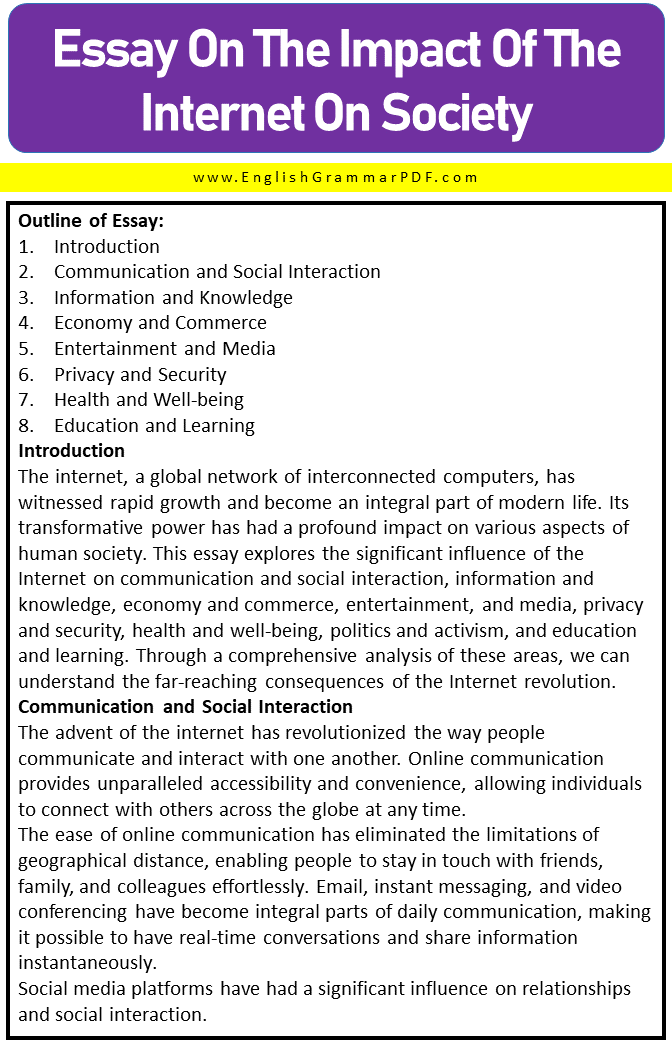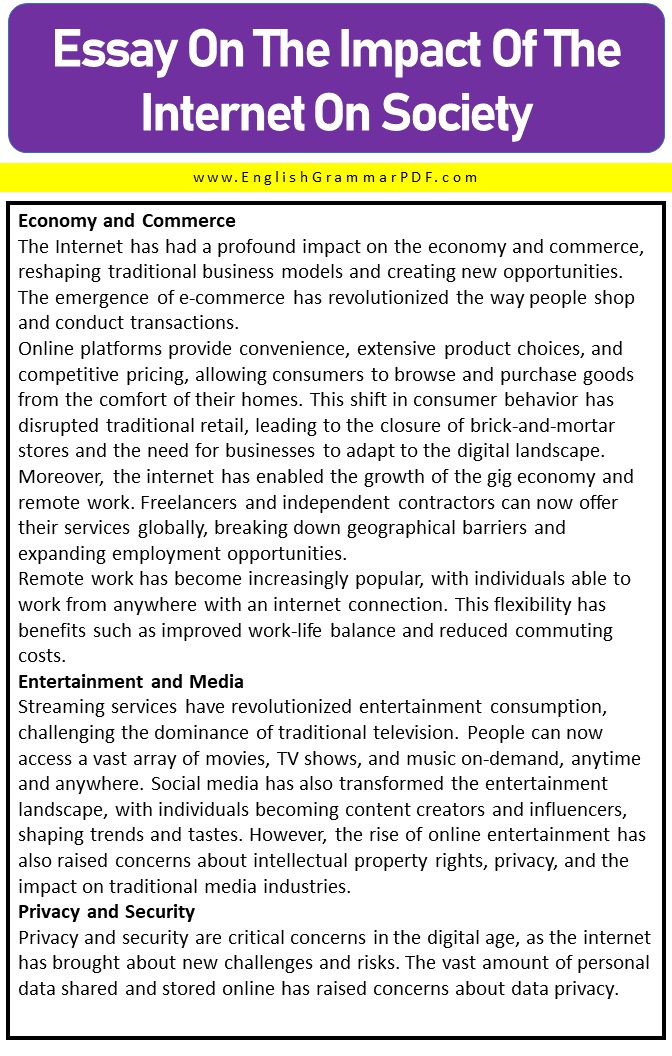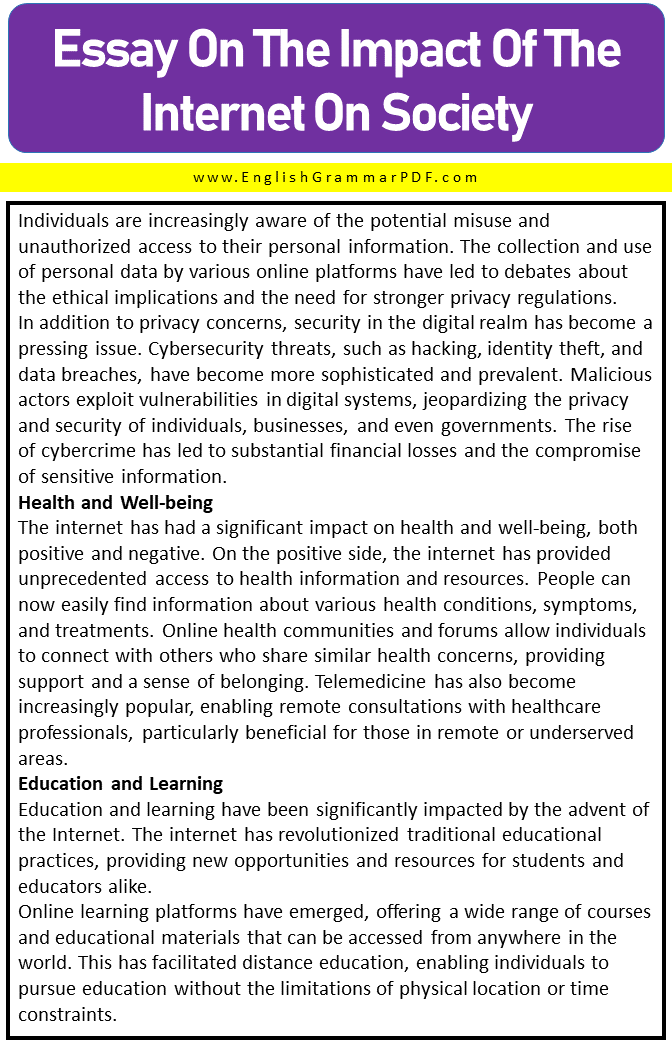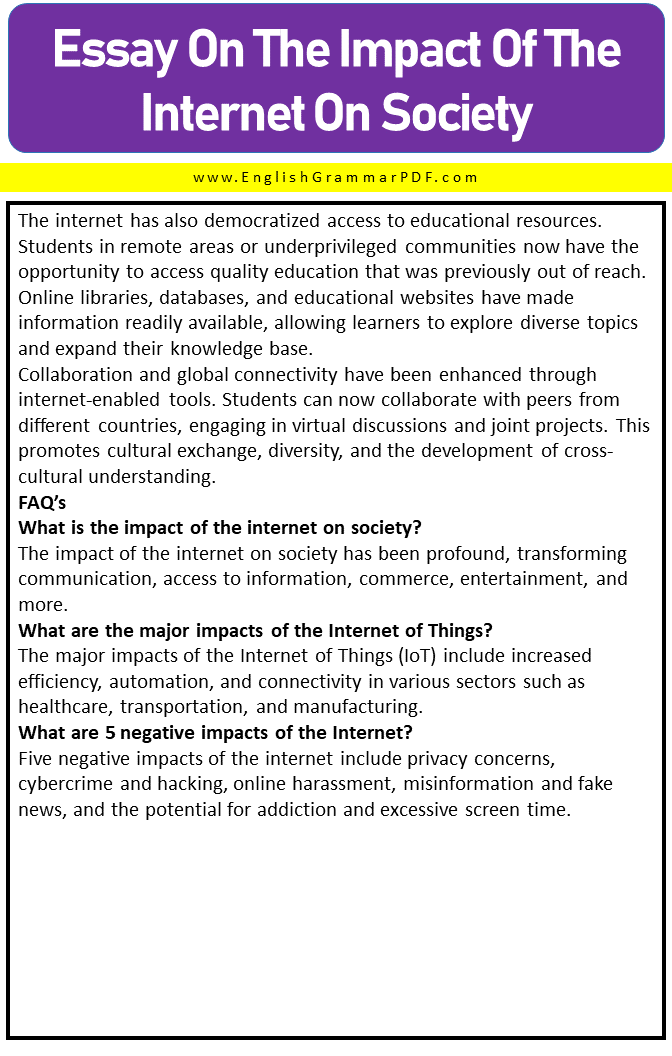Essay On The Impact Of The Internet On Society
Outline of Essay:
- Introduction
- Communication and Social Interaction
- Information and Knowledge
- Economy and Commerce
- Entertainment and Media
- Privacy and Security
- Health and Well-being
- Education and Learning
Introduction
The internet, a global network of interconnected computers, has witnessed rapid growth and become an integral part of modern life. Its transformative power has had a profound impact on various aspects of human society. This essay explores the significant influence of the Internet on communication and social interaction, information and knowledge, economy and commerce, entertainment, and media, privacy and security, health and well-being, politics and activism, and education and learning. Through a comprehensive analysis of these areas, we can understand the far-reaching consequences of the Internet revolution.
Communication and Social Interaction
The advent of the internet has revolutionized the way people communicate and interact with one another. Online communication provides unparalleled accessibility and convenience, allowing individuals to connect with others across the globe at any time.
The ease of online communication has eliminated the limitations of geographical distance, enabling people to stay in touch with friends, family, and colleagues effortlessly. Email, instant messaging, and video conferencing have become integral parts of daily communication, making it possible to have real-time conversations and share information instantaneously.
Social media platforms have had a significant influence on relationships and social interaction. These platforms provide a virtual space where individuals can connect, share experiences, and express opinions. Social media has made it easier to maintain relationships with acquaintances, reconnect with old friends, and form new connections.
However, the impact of social media on relationships is complex. While it offers the opportunity for constant communication, it can also lead to superficial connections and a sense of isolation. It is important to strike a balance between online and offline interactions to ensure meaningful and fulfilling relationships.
Online communities have also emerged as a result of the internet’s influence on social interaction. These communities bring together like-minded individuals who share common interests, hobbies, or goals. They provide a sense of belonging and the opportunity to connect with people who may be geographically distant but share similar passions.
Online communities offer support, knowledge sharing, and opportunities for collaboration. However, it is crucial to recognize that virtual identities can differ from real-life personas, and caution should be exercised when navigating these communities to ensure safety and authenticity.
Overall, the impact of the Internet on communication and social interaction has been profound. The accessibility and convenience of online communication have broken down barriers and fostered connections on a global scale. Social media
Information and Knowledge
One of the most significant impacts of the internet is the wide availability of information and its impact on education. The internet has transformed the way people access and consume knowledge. With search engines and online databases, individuals can easily find information on virtually any topic. However, the abundance of information also brings challenges, such as the rise of fake news and the need for critical thinking skills to verify information sources. The internet has fundamentally altered the educational landscape, enabling online learning platforms, remote education, and global collaboration.
Economy and Commerce
The Internet has had a profound impact on the economy and commerce, reshaping traditional business models and creating new opportunities. The emergence of e-commerce has revolutionized the way people shop and conduct transactions.
Online platforms provide convenience, extensive product choices, and competitive pricing, allowing consumers to browse and purchase goods from the comfort of their homes. This shift in consumer behavior has disrupted traditional retail, leading to the closure of brick-and-mortar stores and the need for businesses to adapt to the digital landscape.
Moreover, the internet has enabled the growth of the gig economy and remote work. Freelancers and independent contractors can now offer their services globally, breaking down geographical barriers and expanding employment opportunities.
Remote work has become increasingly popular, with individuals able to work from anywhere with an internet connection. This flexibility has benefits such as improved work-life balance and reduced commuting costs.
Entertainment and Media
Streaming services have revolutionized entertainment consumption, challenging the dominance of traditional television. People can now access a vast array of movies, TV shows, and music on-demand, anytime and anywhere. Social media has also transformed the entertainment landscape, with individuals becoming content creators and influencers, shaping trends and tastes. However, the rise of online entertainment has also raised concerns about intellectual property rights, privacy, and the impact on traditional media industries.
Privacy and Security
Privacy and security are critical concerns in the digital age, as the internet has brought about new challenges and risks. The vast amount of personal data shared and stored online has raised concerns about data privacy. Individuals are increasingly aware of the potential misuse and unauthorized access to their personal information. The collection and use of personal data by various online platforms have led to debates about the ethical implications and the need for stronger privacy regulations.
In addition to privacy concerns, security in the digital realm has become a pressing issue. Cybersecurity threats, such as hacking, identity theft, and data breaches, have become more sophisticated and prevalent. Malicious actors exploit vulnerabilities in digital systems, jeopardizing the privacy and security of individuals, businesses, and even governments. The rise of cybercrime has led to substantial financial losses and the compromise of sensitive information.
Health and Well-being
The internet has had a significant impact on health and well-being, both positive and negative. On the positive side, the internet has provided unprecedented access to health information and resources. People can now easily find information about various health conditions, symptoms, and treatments. Online health communities and forums allow individuals to connect with others who share similar health concerns, providing support and a sense of belonging. Telemedicine has also become increasingly popular, enabling remote consultations with healthcare professionals, particularly beneficial for those in remote or underserved areas.
Education and Learning
Education and learning have been significantly impacted by the advent of the Internet. The internet has revolutionized traditional educational practices, providing new opportunities and resources for students and educators alike.
Online learning platforms have emerged, offering a wide range of courses and educational materials that can be accessed from anywhere in the world. This has facilitated distance education, enabling individuals to pursue education without the limitations of physical location or time constraints.
The internet has also democratized access to educational resources. Students in remote areas or underprivileged communities now have the opportunity to access quality education that was previously out of reach. Online libraries, databases, and educational websites have made information readily available, allowing learners to explore diverse topics and expand their knowledge base.
Collaboration and global connectivity have been enhanced through internet-enabled tools. Students can now collaborate with peers from different countries, engaging in virtual discussions and joint projects. This promotes cultural exchange, diversity, and the development of cross-cultural understanding.
FAQ’s
What is the impact of the internet on society?
The impact of the internet on society has been profound, transforming communication, access to information, commerce, entertainment, and more.
What are the major impacts of the Internet of Things?
The major impacts of the Internet of Things (IoT) include increased efficiency, automation, and connectivity in various sectors such as healthcare, transportation, and manufacturing.
What are 5 negative impacts of the Internet?
Five negative impacts of the internet include privacy concerns, cybercrime and hacking, online harassment, misinformation and fake news, and the potential for addiction and excessive screen time.
Download the PDF of the Essay:
Explore More Essays:
Essay On The Great Wall Of China








